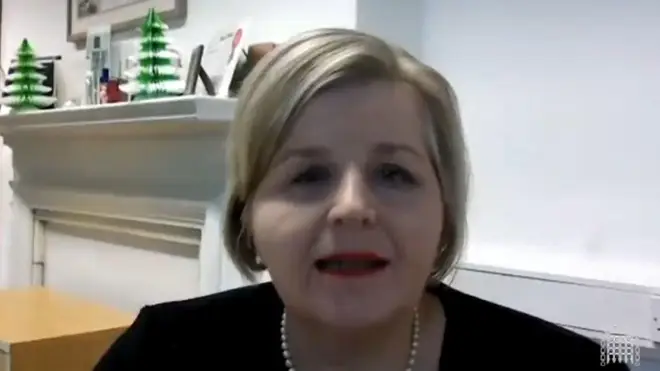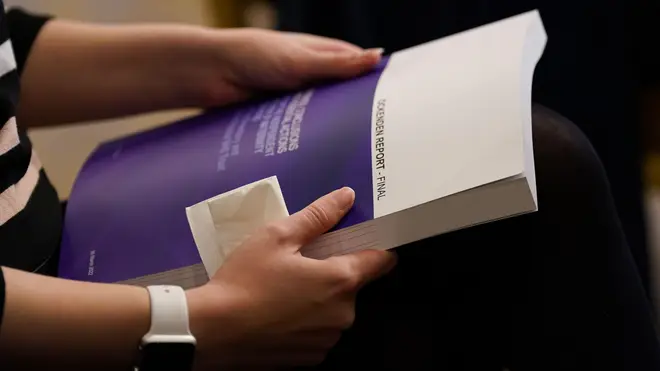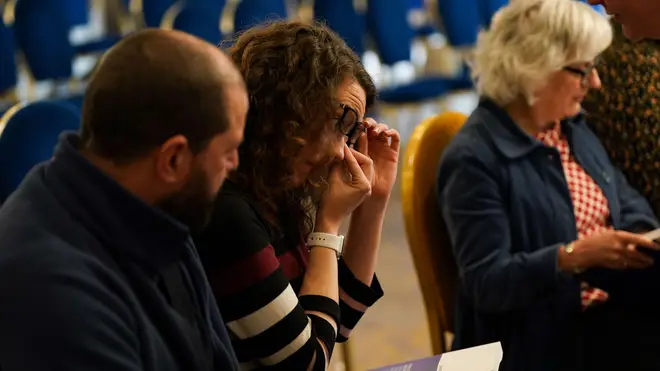
Clive Bull 1am - 4am
30 March 2022, 10:00 | Updated: 30 March 2022, 20:46

An institutional culture of failing to listen to women led to 201 babies dying in the Shrewsbury maternity scandal, Telford MP Lucy Allan has said.
It comes after Sajid Javid revealed police are now investigating 600 cases related to the scandal, following a damning inquiry.
The report found that some 201 babies and nine mothers might have survived if they had received better maternity care.
Mothers and babies died or suffered major injuries due to "repeated failures" at Shrewsbury and Telford Hospital NHS trust, an independent inquiry into the UK's biggest maternity scandal has found.
It presided over catastrophic failings for 20 years - and did not learn from its own inadequate investigations - which led to babies being stillborn, dying shortly after birth or being left severely brain damaged.
Speaking on LBC's Tonight with Andrew Marr, Ms Allan said: "This particular trust, if you look at the stats, is very much a standout case.
"But it's inevitable that the culture that led to these instances is something that does plague the NHS."
She added: "It's the culture of management being in denial, institutional blindness to what's going on, and not listening to the voice of women.
"I do feel that is something that is prevalent elsewhere within the NHS.
"I used to be a non-executive director of an NHS trust – I do think this is something we have to tackle.
"We must listen to the voices of women."
Institutional blindness, a lack of accountability, senior management not feeling responsible for tragedies on their watch, not listening to the voices of women @OckReview harrowing and brutal pic.twitter.com/541K0BseuL
— Lucy Allan MP (@lucyallan) March 30, 2022
Watch Tonight with Andrew Marr exclusively on Global Player every Monday to Thursday from 6pm to 7pm.
West Mercia Police said an inquiry was ongoing in close liaison with the Ockenden review team.
Detective Chief Superintendent Damian Barratt, who is leading the investigation, said: "Our investigation, named Operation Lincoln, was launched in 2017 to explore whether there is evidence to support a criminal case against the trust or any individuals involved.
"This investigation remains ongoing and very much active.
"This is a highly complex and very sensitive investigation that has required us to speak to a large number of people to gather as much information as we can."
The inquiry is consulting with a number of medical specialists, said the senior officer, who also confirmed that no arrests have been made.
You can also listen to the podcast Tonight with Andrew Marr only on Global Player.
During a statement to MPs on Wednesday, Health Secretary Sajid Javid offered assurances that the people responsible for "serious and repeated failures" will be held to account.
The Health Secretary said: "I'd like to reassure MPs that a number of people who were working at the trust at the time of the incidents have been suspended or struck off from the professional register, and members of senior management have also been removed from their posts.
"There is also an active police investigation, Operation Lincoln, which is looking at around 600 cases."
Read more: Justice Sec to challenge parole board decision to free Baby P's mother Tracey Connelly
Read more: Welsh Tory comes out as first trans MP after revealing rape and £50,000 blackmail plot
‘They’re scared to speak up and say things aren’t right.’
— LBC (@LBC) March 30, 2022
Despite damning Ockenden maternity deaths report into Shrewsbury and Telford trust, staff still have concerns according to @ShaunLintern from the Sunday Times. @ShelaghFogarty pic.twitter.com/9HFtC52Ifa
Several mothers died after failings in care, while others were made to have natural births despite the fact they should have been offered a Caesarean.
Some babies suffered skull fractures, broken bones or developed cerebral palsy after traumatic forceps deliveries, while others were starved of oxygen and experienced life-changing brain injuries.
The damning report, led by maternity expert Donna Ockenden, examined cases involving 1,486 families between 2000 and 2019, and reviewed 1,592 clinical incidents.
It is the largest-ever inquiry into a single service in the history of the health service and has wide-ranging implications for the maternity in the NHS.
Read more: Two-year-old boy dies after being mauled by dog at a property in Worcestershire
Read more: We are a tax-cutting government, insists Boris Johnson days before NI hike
Thank you Donna Ockenden & team for a very thorough Inquiry. The numbers of families affected, & over two decades, is a truly shocking account. List of immediate actions & longer term recommendations for maternity services, locally & nationally, must be actioned by SaTH & govt
— Rt Hon Mark Pritchard MP (@MPritchardUK) March 30, 2022
Louise Barnett, Chief Executive at The Shrewsbury and Telford Hospital NHS Trust said: "Today’s report is deeply distressing, and we offer our wholehearted apologies for the pain and distress caused by our failings as a Trust.
"We have a duty to ensure that the care we provide is safe, effective, high quality, and delivered always with the needs and choices of women and families at its heart.
"Thanks to the hard work and commitment of my colleagues, we have delivered all of the actions we were asked to lead on following the first Ockenden Report, and we owe it to those families we failed and those we care for today and in the future to continue to make improvements, so we are delivering the best possible care for the communities that we serve.”
One mother whose baby died as a result of poor care was Rhiannon Davies from Ludlow, Shropshire who on March 1 2009 gave birth to her daughter Kate.
Kate Stanton-Davies lived for only a few hours due to a failure of Shrewsbury midwives to recognise the baby needed emergency care. An inquest jury ruled her death could have been avoided but the trust has insisted its care had been in line with national guidelines.
The inquiry identified "hundreds of cases" where the trust failed to undertake serious incident investigations, while deaths were not investigated appropriately.
Another couple who have led the campaign for safer care are Kayleigh and Colin Griffiths, whose daughter Pippa died in 2016 from a Group B Strep infection. A year later, a coroner ruled her death could have been avoided.
Read more: Welsh Tory comes out as first trans MP after revealing rape and £50,000 blackmail plot
Read more: American woman, 23, visiting British boyfriend killed looking wrong way crossing road

As well as major issues within the trust, the report pointed the finger at external bodies, which did not effectively monitor the care provided.
Where investigations did take place, they did not meet expected standards and failed to identify improvements, meaning lessons could not be learned and families experienced repeated serious incidents and harm.
Ms Ockenden said: "Throughout our final report we have highlighted how failures in care were repeated from one incident to the next.
"For example, ineffective monitoring of foetal growth and a culture of reluctance to perform Caesarean sections resulted in many babies dying during birth or shortly after their birth.
"In many cases, mother and babies were left with life-long conditions as a result of their care and treatment.
She added: "There was a tendency of the trust to blame mothers for their poor outcomes, in some cases even for their own deaths.
"What is astounding is that for more than two decades these issues have not been challenged internally and the trust was not held to account by external bodies.
"This highlights that systemic change is needed locally, and nationally, to ensure that care provided to families is always professional and compassionate, and that teams from ward to board are aware of and accountable for the values and standards that they should be upholding.
"Going forward, there can be no excuses."
Ms Ockenden's team of investigators found families were locked out of reviews when things went wrong and were often treated without compassion and kindness.
The trust, which is currently ranked inadequate, was also found to have repeatedly failed to adequately monitor baby's heart rates, with catastrophic results, alongside not using drugs properly in labour.

Leaders and midwives were found to pursue a strategy of keeping Caesarean section rates low, despite the fact this repeatedly had severe consequences.
Richard Stanton and Rhiannon Davies, who have campaigned for years over the poor care, lost their daughter Kate hours after her birth in March 2009.
The trust noted the death but described it as a "no harm" event, although an inquest jury later ruled Kate's death could have been avoided. The trust still insisted its care had been in line with national guidelines.
In her study, Ms Ockenden identified nine areas - and 60 actions - for learning and improvement at the trust, including management of patient safety, patient and family involvement in care and investigations, complaints processes, and staffing.
In addition, 15 "immediate and essential actions" for all maternity services in England are put forward, covering 10 key areas, including that NHS England must commit to a long-term investment plan to ensure the "provision of a well-staffed workforce".
The report added that appropriate, minimum staffing levels must be agreed nationally and locally, and adhered to, while there should be a clear escalation policy when staffing levels are not met.
Furthermore, every trust should also have a patient safety specialist for maternity services, while "meaningful" incident investigations should happen, with proof of learning six months later.

Other actions include all trusts having consultants review postnatal readmissions, while bereavement services must be available seven days a week.
Some £127million has been committed by NHS England for maternity services but the report said this is "still significantly short" of the £200-£350million recommended by MPs in 2021.
Ms Ockenden said: "A death of a mother or baby, or a birth incident which results in an injury should never be ignored.
"There should never again be a review of this scale, in both numbers, and the length of years across which these concerns remained hidden."